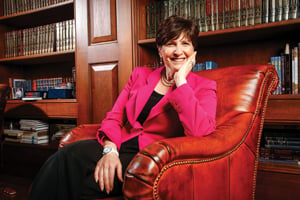Opening Statements
New program at Hastings Law teaches students about startups

Photo of Robin Feldman by Tony Avelar
Shooshani is participating in the 2-year-old Startup Legal Garage, which gives students a real-world, client-based education in representing early-stage technology and biotech companies.
Professor Robin Feldman, who founded the program at the University of California's Hastings College of the Law in San Francisco, says most client-based educational programs are litigation-based. "I realized there was no reason that client-based education should be limited to litigation, especially when 40 percent of our students go into transactional work," says Feldman, director of Hastings' Institute for Innovation Law.
Twenty law firms—including Wilson Sonsini Goodrich & Rosati, Fenwick & West and Morrison & Foerster—have partnered with the SLG. Attorneys from these firms oversee students working with the startups to help with entity formation and structuring, as well as intellectual property strategies. In an accompanying seminar led by professors, entrepreneurs and in-house counsel, students share their work (redacted for confidentiality) and discuss the nuances of client service. Rather than reading hypos "from a dusty casebook," Feldman says the students examine vesting schedules, purchase agreements and stock certificates.
Last year, Shooshani worked with two companies—one a developer of a hand-held spirometer and the other the creator of an enzyme that breaks down plastic—that needed to know whether their inventions were patentable. "We provided a free service that otherwise would have cost thousands of dollars," Shooshani says. The experience confirmed his passion for startup work and provided practicable skills.
Companies receiving assistance are first vetted by incubators, including Hackers/Founders, Women 2.0 and Black Founders, to ensure they're project-ready. Consistent with Hastings' public mission, the Startup Legal Garage is particularly committed to assisting female and minority founders.
The SLG model, which "combines the best of doctrinal teaching and experiential learning," is both cost-effective and scalable, Feldman adds. While typical clinics have a resource-intensive ratio of one professor for every 10 or 12 students, this one has practicing lawyers supervising two-student teams while one professor teaches a large seminar.
Next up for Feldman is figuring out whether the model can be duplicated.
"We have natural advantages being in the Bay Area," Feldman concedes. "But all law schools have small businesses nearby and growing enterprises with basic, corporate legal needs and no resources to access them."
To help answer that question, the program received a special grant to create a playbook for other law schools. Feldman expects to have that "open source model" completed this academic year.
This article originally appeared in the November 2014 issue of the ABA Journal with this headline: "Under the Hood: A new program at Hastings Law teaches students about startups."



